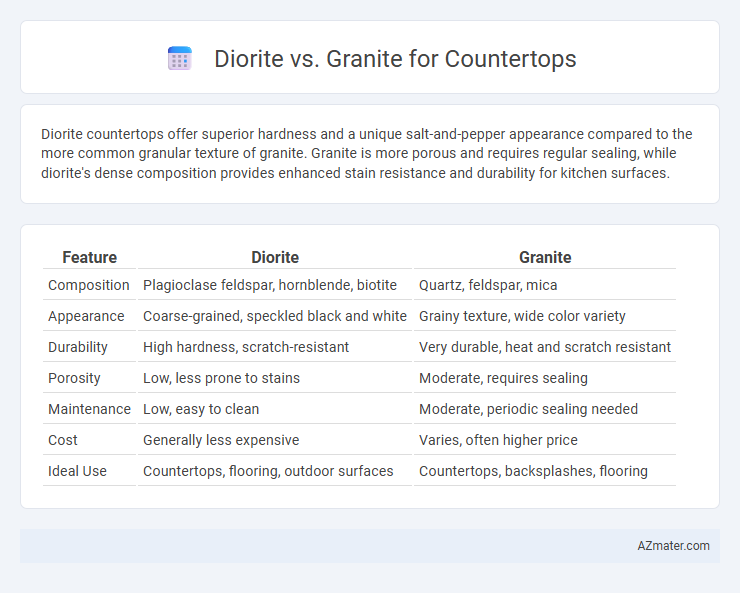Diorite countertops offer superior hardness and a unique salt-and-pepper appearance compared to the more common granular texture of granite. Granite is more porous and requires regular sealing, while diorite's dense composition provides enhanced stain resistance and durability for kitchen surfaces.
Table of Comparison
| Feature | Diorite | Granite |
|---|---|---|
| Composition | Plagioclase feldspar, hornblende, biotite | Quartz, feldspar, mica |
| Appearance | Coarse-grained, speckled black and white | Grainy texture, wide color variety |
| Durability | High hardness, scratch-resistant | Very durable, heat and scratch resistant |
| Porosity | Low, less prone to stains | Moderate, requires sealing |
| Maintenance | Low, easy to clean | Moderate, periodic sealing needed |
| Cost | Generally less expensive | Varies, often higher price |
| Ideal Use | Countertops, flooring, outdoor surfaces | Countertops, backsplashes, flooring |
Introduction to Diorite and Granite Countertops
Diorite and granite are popular choices for kitchen countertops due to their durability and aesthetic appeal. Diorite features a coarse-grained texture with a mix of light and dark minerals, offering a unique speckled appearance ideal for modern and traditional designs. Granite, known for its hardness and wide range of colors, provides excellent resistance to heat, scratches, and stains, making it a practical and long-lasting surface option.
Visual Differences: Diorite vs Granite
Diorite countertops showcase a distinctive salt-and-pepper appearance with a mix of light and dark mineral grains, creating a speckled or mottled texture. Granite typically displays a broader range of colors with more pronounced veining or swirling patterns, offering a more varied and often bolder visual impact. The contrast in diorite's granular, consistent pattern versus granite's diverse and intricate designs makes each stone uniquely suited for different aesthetic preferences in countertop surfaces.
Durability and Hardness Comparison
Diorite offers exceptional durability with a Mohs hardness rating of 6 to 7, making it highly resistant to scratches and wear, ideal for kitchen countertops. Granite surpasses diorite slightly with a Mohs hardness of 6 to 7 but typically exhibits better resistance to heat and impact, ensuring long-lasting performance in high-use areas. Both stones provide excellent hardness and toughness, but granite's widespread availability and proven resilience often make it a preferred choice for durable countertop surfaces.
Maintenance Needs and Care Tips
Diorite countertops require minimal maintenance due to their dense and less porous structure, making them highly resistant to stains and scratches compared to granite. Granite needs regular sealing, typically once a year, to prevent moisture absorption and maintain its durability against heat and abrasions. For both materials, using mild soap and a soft cloth for daily cleaning, avoiding harsh chemicals, and promptly wiping spills helps prolong their aesthetic appeal and functional lifespan.
Cost Analysis: Diorite vs Granite Countertops
Diorite countertops generally cost between $50 to $75 per square foot, while granite countertops range from $40 to $100 per square foot depending on quality and origin. The installation of diorite tends to be slightly more expensive due to its hardness, which requires specialized tools and labor. Granite offers more budget flexibility with various price points, making it a preferred choice for cost-conscious remodeling projects.
Stain and Scratch Resistance
Diorite offers superior scratch resistance compared to granite due to its dense mineral composition, making it ideal for high-traffic countertop areas. Both materials exhibit strong stain resistance when properly sealed, but granite's porosity can vary, requiring more frequent maintenance to prevent discoloration. The hardness rating of diorite generally surpasses granite on the Mohs scale, enhancing its durability against daily wear and tear.
Installation Process and Requirements
Diorite countertops require skilled installers due to their dense, hard composition, which demands specialized cutting and polishing tools to prevent chipping. Granite also involves a complex installation process but is more widely available with standardized methods and tools, making it somewhat easier to source qualified fabricators. Both materials require a sturdy substrate for support, precise templating, and professional sealing to enhance durability and maintain resistance to stains and scratches.
Sustainability and Environmental Impact
Diorite countertops offer superior sustainability compared to granite due to their longer lifespan and reduced need for frequent replacement, minimizing resource consumption over time. Granite extraction often involves extensive quarrying, leading to higher environmental degradation and carbon emissions, whereas diorite's denser composition results in less waste during fabrication. Choosing diorite supports eco-friendly construction by reducing energy-intensive processing and promoting durability in kitchen surfaces.
Popular Design Styles for Each Stone
Diorite countertops complement modern and contemporary design styles with their unique speckled patterns and subtle color variations, adding a sophisticated and sleek aesthetic to kitchens and bathrooms. Granite countertops are favored in traditional and rustic design styles due to their varied color palettes and natural veining, which provide warmth and timeless elegance. Both stones offer durable surfaces, but diorite's refined appearance suits minimalist spaces, while granite's bold textures enhance classic and farmhouse interiors.
Choosing the Best Stone for Your Kitchen Countertop
Diorite offers a unique blend of durability and aesthetic appeal with its coarse-grained texture and dark, speckled patterns, making it a striking choice for kitchen countertops. Granite remains a top contender due to its exceptional hardness, resistance to scratches and heat, and wide range of colors and patterns that suit various kitchen designs. When choosing the best stone for your kitchen countertop, consider factors such as maintenance, budget, and overall kitchen style to determine whether the robust elegance of diorite or the proven versatility of granite aligns better with your needs.

Infographic: Diorite vs Granite for Countertop
 azmater.com
azmater.com